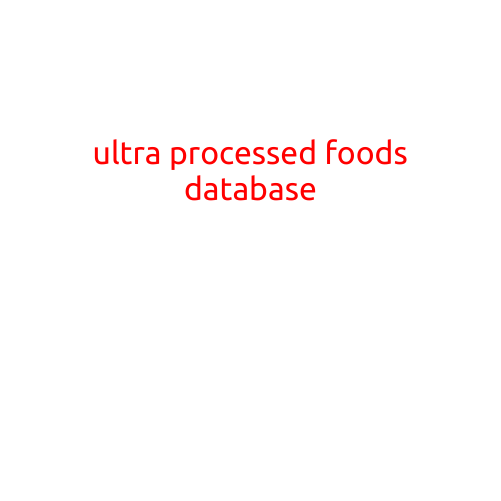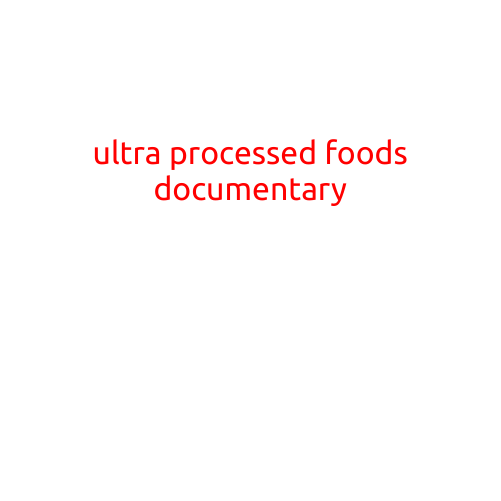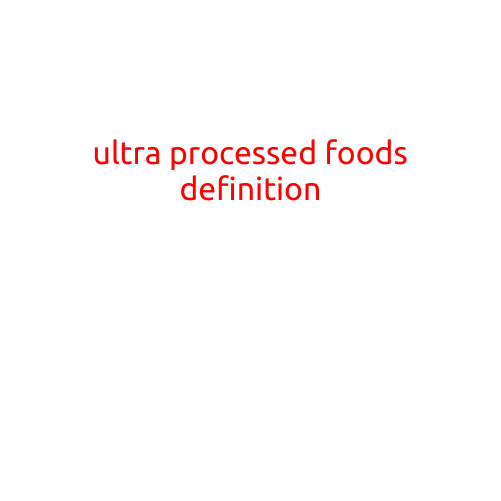
Ultra-Processed Foods Dangers: The Hidden Threat to Your Health
In recent years, the food industry has undergone a significant transformation, with the rise of ultra-processed foods (UPF) becoming a dominant force in the global food landscape. While these foods may be convenient, affordable, and appealing, they pose a significant threat to our health and well-being.
What are Ultra-Processed Foods?
Ultra-processed foods are defined as products that have been significantly transformed from their natural state through various processing methods, such as blending, extrusion, and molding. They often contain a mix of ingredients, including sugar, salt, and unhealthy fats, as well as added preservatives, flavor enhancers, and coloring agents.
Examples of ultra-processed foods include:
- Packaged snacks like chips, crackers, and cookies
- Frozen meals like pizza, stir-fries, and TV dinners
- Baked goods like cakes, pastries, and muffins
- Sugary drinks like soda, sports drinks, and energy drinks
- Refined grain products like white bread, white rice, and pasta
The Dangers of Ultra-Processed Foods
Research has shown that consuming ultra-processed foods regularly can have serious consequences for our health. Some of the dangers associated with UPF include:
- Increased Risk of Obesity: UPFs are high in calories, sugar, and unhealthy fats, which can lead to weight gain and obesity. A study published in the journal BMJ found that consuming UPFs regularly was associated with a higher risk of obesity, even after controlling for other factors like diet quality and physical activity.
- Increased Risk of Chronic Diseases: A diet high in UPFs has been linked to an increased risk of chronic diseases like heart disease, type 2 diabetes, and certain types of cancer. A study published in the journal Nutrition Reviews found that UPF consumption was associated with a higher risk of premature death from heart disease and type 2 diabetes.
- Weakened Gut Health: UPFs are often lacking in fiber and other beneficial nutrients, which can disrupt the balance of gut bacteria and lead to issues like digestive problems, inflammation, and impaired immune function.
- Increased Risk of Mental Health Problems: Some studies have suggested that a diet high in UPFs may be associated with an increased risk of mental health problems like depression and anxiety. The artificial additives and preservatives found in UPFs may contribute to these effects.
- Reduced Nutrient Intake: UPFs are often designed to be highly palatable and addictive, leading to overconsumption and neglect of nutrient-dense foods like fruits, vegetables, whole grains, and lean proteins. This can lead to nutrient deficiencies and other health problems.
How to Avoid Ultra-Processed Foods
While it’s not possible to completely eliminate UPFs from our diet, there are steps we can take to reduce our consumption:
- Read Labels Carefully: Pay attention to ingredient lists and nutrition labels. If a product contains a high number of additives, preservatives, and artificial ingredients, it’s likely a UPF.
- Choose Whole Foods: Prioritize whole, unprocessed foods like fruits, vegetables, whole grains, lean proteins, and healthy fats.
- Prep Your Own Meals: Cooking meals from scratch allows you to control the ingredients and portion sizes, reducing the likelihood of UPF consumption.
- Shop the Perimeter of the Grocery Store: The healthiest foods are often found on the perimeter of the grocery store, including fresh produce, meats, and dairy products.
Conclusion
Ultra-processed foods pose a significant threat to our health and well-being, due to their high levels of sugar, salt, and unhealthy fats, as well as their lack of essential nutrients and beneficial fiber. By being aware of the dangers of UPFs and taking steps to reduce our consumption, we can maintain a healthier, more balanced diet and reduce our risk of chronic diseases.





